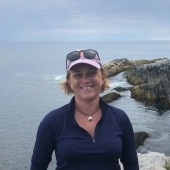
Harnessing the power of storytelling and storylistening for building social contracts

Harnessing the power of storytelling and storylistening for building social contracts
About the speaker:
In July 2022, Holly was named director of the Schiller Coastal Studies Center at Bowdoin College. In addition to her oversight of this marine science field station, Holly is growing the Center’s programs to include the local community, regional and global partners in interdisciplinary approaches to sustainable development.
Company info:
The Schiller Coastal Studies Center (SCSC) at Bowdoin College is a multidisciplinary campus on 118 acres of forest and meadows along Maine’s rocky Atlantic coast—with easy access to the Gulf of Maine.
The Schiller facilities provide opportunities—unlike those available at any other liberal arts college in the country—for field- and laboratory-based interdisciplinary study related to critical issues of coastal and climate concern. With its oceanside location and modernized research and teaching facilities, the Schiller Center is foundational to Bowdoin’s expanding role as a leader in environmental studies.
Presentation:
This talk will take a step back from the what and the why of our commitment to building sustainable blue economies to consider who and how? As sustainability practitioners we often spend our time in vibrant echo chambers. We’re invigorated by debates about how to support just and sustainable economies. But what happens outside that echo chamber? What happens when we meet “the other - a neighbor, a colleague or a decision maker who doesn’t share our urgency for action? Do we go it alone as we seek to make change? Or do we need to build new, unexpected partnerships in order to see our visions become reality? Western data and scientific language are persuasive to some audiences. But for others, they carry less power. Storytelling and “storylistening” are vital tools to breaking down perceived barriers to collaboration and cooperation. Sustainability practitioners should challenge ourselves to approach those of opposing views with empathy. Storylistening, which includes asking questions that elicit lived experiences, creates understanding of how a point of view has been created through loss and gain, through fears and hopes. We can begin understanding the person beyond the position. We can further build trust by storytelling, sharing our own lived experience, and may create the opportunity to find common ground on which to see our visions realized.
Interview:
1) When was the first time you got involved with seaweeds and why?I became involved in seaweeds in 2018. My role as the director of the Institute for North Atlantic Studies at the University of New England made me realize that Maine's growing seaweed industry - spanning from aquaculture and natural harvesting to value creation through unique products and research partnerships - was evolving in the context of a much broader and international ecosystem. I became very interested in how communication between stakeholder groups here in Maine could influence and impact how our coastal communities adopt and embrace this new element to our blue economy.
2) What is your view on the US seaweed industry in 2030?
There is tremendous potential for seaweed in the U.S. Here in Maine, where we have a blue economy dominated by one fishery - lobstering - seaweed aquaculture, as well as the development of the local value chain, has the potential to help diversify our blue economy and offer current fishers new opportunities, as well as attract new people to careers on the water.
3) What will you be talking about at Seagriculture USA 2023?
I will be speaking about the role of storytelling and listening in building capacity for change in coastal communities. I was struck at last year's conference by the attendees' universal enthusiasm for expanding the seaweed industry in Maine. Like many conferences, we do end up in a bit of an echo chamber. But it left me thinking, what happens when we try to implement this work in our small, coastal communities where those working on our waters and waterfronts are already experiencing pressures and stressors? What if they do not welcome these initiatives with open arms and minds? In my own work in sustainability, I have found that the art of storylistening - which includes asking questions that elicit lived experiences and creates understanding of how a point of view has been created through loss and gain, through fears and hopes - can help us begin to understand the person beyond the opposing position. We can further build trust by storytelling, sharing our own lived experience, and may create the opportunity to find common ground where it seemed impossible.